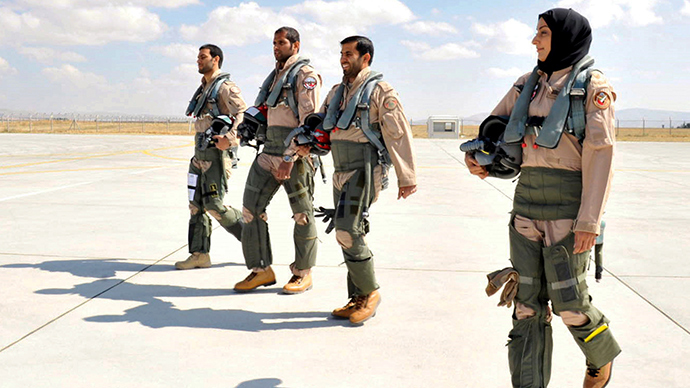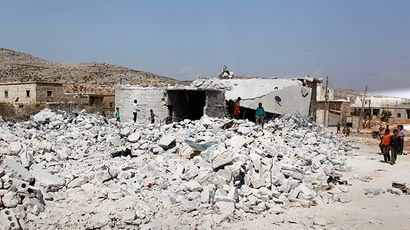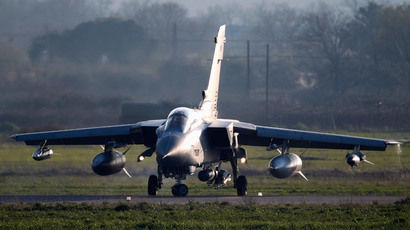UAE pilots off anti-ISIS missions since December – US officials

US officials have been concealing the fact that the UAE stopped its pilots from performing strikes against the Islamic State after a Jordanian pilot was shot down over Syria in December and subsequently burnt alive in a horrific execution.
The UAE Air Force’s role has been reduced to noncombat activities.
“I can confirm that UAE suspended air strikes shortly after the Jordanian pilot's plane went down,” a US official told AFP.
This had been preceded by the New York Times citing two US officials speaking on condition of anonymity that the UAE said they had taken the decision due to the impotence of the anti-IS coalition to conduct effective search and rescue operations.
First Lieutenant Moaz al-Kasasbeh of the Jordanian Air Force, who was captured by Islamic State (IS, formerly ISIS/ISIL) militants near Syria’s Raqqa, paid with his life for the alleged incompetence of the coalition’s search and rescue operations. The pilot was burnt alive while locked up in a cage.
A senior American military official said IS militants captured Lieutenant Kasasbeh “within just a few minutes,” a senior American military official said earlier to the New York Times, adding that “there was no time for us to engage.”
Yet UAE officials claim that the Pentagon’s search-and-rescue force, including the V-22 Osprey tilt-rotor aircrafts, is stationed in Kuwait, hundreds of kilometers from northern Iraq, where operations against the Islamic State are underway.
ICYMI: US pilots assess UAE withdrawal from ISIS air war, al-Kasasbeh murder http://t.co/SoNBkFwy4p | By @Oriana0214pic.twitter.com/BOhCEZPhk0
— Andrew deGrandpre (@adegrandpre) February 5, 2015
The US officials that commented on the situation with the Jordanian pilot to the AFP insisted that the location of rescue operations was not affected by aircraft.
“As soon as the plane went down, an intensive airborne search was immediately initiated, and personnel recovery forces were moving toward the pilot's last known location,” a defense official said.
"For obvious reasons we don't discuss specific response timelines for personnel recovery, but that was not a major factor in this case. We were not able to locate the pilot before he was picked up by ISIL (Islamic State) forces,” the source insisted.
The official added that American pilots on missions to bomb IS positions face the same risks.
“When American pilots fly over enemy territory, they know there are risks involved, but they also know they are backed by an unswerving commitment to recover them if they go down,” the AFP source said.
Said Arikat, journalist and former UN spokesman for Iraq, told RT that it was “almost certain” there was an attempt to rescue the pilot by Jordanian special forces on January 3, but the attempt failed, as the rescue party lost a Chinook helicopter and the fighter pilot, al-Kasasbeh, was burnt immediately afterwards.
“Arab countries are now reluctant to be front and centre in the campaign,” said Theodore Karasik, a security... http://t.co/JphyIeXg08
— theodore karasik (@tkarasik) February 5, 2015
By burning the Jordanian pilot alive, the Islamic State wants to scare everybody, Arikat said, because this is “not something Muslims or Arabs have done (before), even ISIS.”
“They want to shock and gain recruits at the same time,” Arikat said.
The UAE, America’s key ally in the region, was one of the first Arab nations that joined the US-led anti-IS coalition. The country continues participating by taking part in non-combat activities and missions.
“Let me be clear that UAE continues to be an important and valuable partner that is contributing to the coalition,” the AFT source stressed.
Other Arab states that joined the anti-IS coalition, such as Bahrain, Jordan and Saudi Arabia, are continuing with airstrikes against the terrorist organization.Arab media reported on Thursday that Jordan is even considering a ground military offensive against the Islamic State.
Said Arikat said: “Occasional bombardment, no matter how intense it is, is not going to regain ground [from the Islamic State].”
“You cannot fight ISIS except by soldiers, by armies,” Arikat said, stressing that so far only the Syrian army has been successfully repelling the militant group on the ground.
The anti-IS coalition initiated by the US in August 2014 is formed of countries with different agendas, either involving direct military activities or assisting them. Also, the countries have specializations of their own, fighting IS in Iraq, or Syria, or both.
The absolute majority of the air raids, over 80 percent, are being carried by American pilots.
The full list of the anti-IS coalition includes: Australia, Bahrain, Belgium, Canada, Denmark, Iraqi Kurdistan, France, Germany, Italy, Jordan, Morocco, the Netherlands, New Zealand, Norway, Portugal, Qatar, Saudi Arabia, Spain, Turkey, UAE, the UK and the US.














